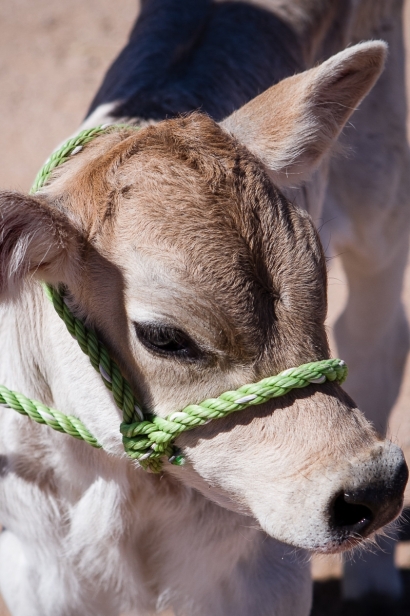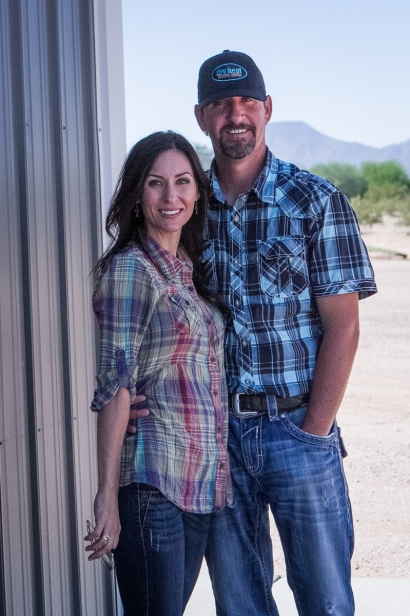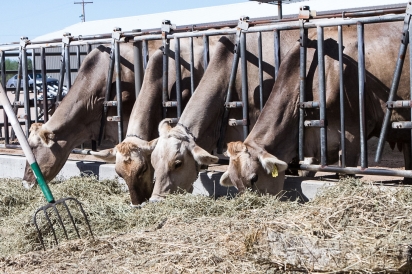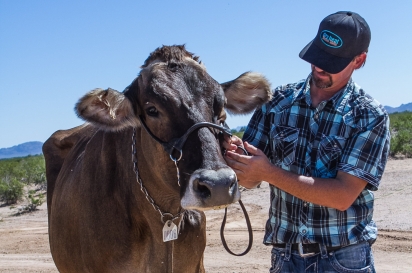Dairying in the Desert
Fond du Lac Farms is located on a wide-open stretch of I-8, west of Casa Grande where, just off the highway, signs for “Open Range” appear and the land rolls on with saguaro and sagebrush to the horizon.
Cows and cacti are two things that just don’t seem to go together: Rolling green pastures are not the norm in the desert Southwest. But with a valley full of people waking up to the value and quality of fresh, local and sustainable products, the market for local, raw milk is clearly an emerging niche.
And it’s here, on this remote stretch of road favorably situated between the food-savvy Phoenix and Tucson metros, that a fourth-generation Arizona dairyman and his family have forged an alternative path, producing high-quality raw milk on a small-batch scale.
Rick Anglin and his wife, Kristin, along with her parents, Dale and Marilyn Tuck, built the Fond du Lac Farms facility, literally from the ground up—bringing in power and digging a well before building the barn, milking parlor and bottling area. Their vision: to be a “new farm with old time principles”.
Rick’s grandfather, a dairyman from Canada, moved to Phoenix in 1952 and started milking 22 cows on a farm near the present-day Ikea.
“I’ve always been a cow man,” Anglin notes. “I was always taught to take care of the cows that take care of me.”
The farm’s micro-herd of 15 Brown Swiss cows contentedly munch bales of alfalfa as Anglin shows me around. The large-stature cows with big soulful eyes and an inquisitive nature are prized for their rich and flavorful milk.
Though he appreciates all cattle breeds, Anglin says, “The Brown Swiss are a good middle ground. They are more of a heritage breed, haven’t been over-bred and haven’t lost the typical characteristics” as have some of the other dairy breeds.
The herd got its start in Fond du Lac, Wisconsin, when the Anglins made a trip up north to bring back two cows. The trip was also the inspiration for the name of the farm, suggested by his teenage daughter as an homage to the first cows. The fifth generation of that original herd, a calf named Faith, was recently born on the farm, as the bloodlines continue.
“Here in the desert, we have to bring the feed to them,” he says. “You have to do what an area calls for. We can’t create a fictitious pasture in the middle of a desert just so people can feel good.”
This, he asserts, is one of the many problematic areas around organic certification for dairy, particularly in dry regions. To get the certification, among other things, the cows must be on pasture at least 120 days during the growing season, not practical for these desert-dwelling cattle. The well-fed herd feasts on alfalfa and dry grass with no soy, corn or byproducts. They are not treated with hormones or routine antibiotics and no pesticides are used.
Another downside to organic certification is that animals who require antibiotic treatment for therapeutic reasons are required to be culled from the herd. For a dairy farmer who has a name for each of the animals—not the norm in cow dairies, though standard in many small goat dairies—this was a deal breaker.
At a time when 80% of all antibiotic use in the U.S. is in livestock feed, this type of farming is definitely not the norm. But then, neither is the milk. Standardized whole milk is 3.25% butterfat but the Brown Swiss averages 4% butterfat, which is perfect for aficionados of rich milk or for cheesemaking.
The dairy was custom built for the large-stature Brown Swiss and for the rigorous sanitation required to produce raw milk. It is based on the design of the more traditional pole barn of yesteryear with a herringbone-style milking parlor. The motto of this approach was “Purposeful and Simple.”
“It is designed so one person can do it right,” says Anglin.
“There is milk made for pasteurization, and milk made for drinking,” he says. “It’s not easy to put out a quality raw product. It takes a lot of work. Our integrity is on the line and if the product is not right, we don’t send it.”
The extra testing and rigorous cleanliness standards are just a cost of doing business. “We let the milk speak for itself,” he insists. “Both can be done well, but it takes extra effort to keep the quality standards necessary for a raw product.”
It’s also a real family operation. Rick focuses on the dairy and the animals and wife Kristin handles the marketing, social media and some deliveries. Anglin’s mother-in–law, Marilyn takes orders and does the bookkeeping, while father-in-law Dale delivers milk to small and independent groceries in Tucson and throughout the Valley
Social media has helped propel sales, alerting customers when new deliveries have arrived at their local market. Early sales have been promising with the half-gallon containers, which retail for $7.50—“flying off the shelves” at select east Valley Sprouts stores, Agritopia Farmers’ Market, La Grande Orange and other specialty markets in Phoenix and Tucson. Milk is also available on the farm three days a week.
And it’s not just specialty grocers that are clamoring for the product. Local chefs and baristas are also taking notice. Recently, at the National Barista Championships held in San Diego, the signature drink from competitor Harlin Glovacki from Nom de Plume Roasters in Phoenix featured Fond du Lac milk and helped Glovacki secure a place at the 2015 U.S. Barista Championship.
Whether you’re choosing Fond du Lac Farms raw milk because of its local, sustainable mission and scale, its high quality and delicious taste or the potential health benefits that come from consuming a live product, it is a great thing to see more choices available for Valley residents in the know.








